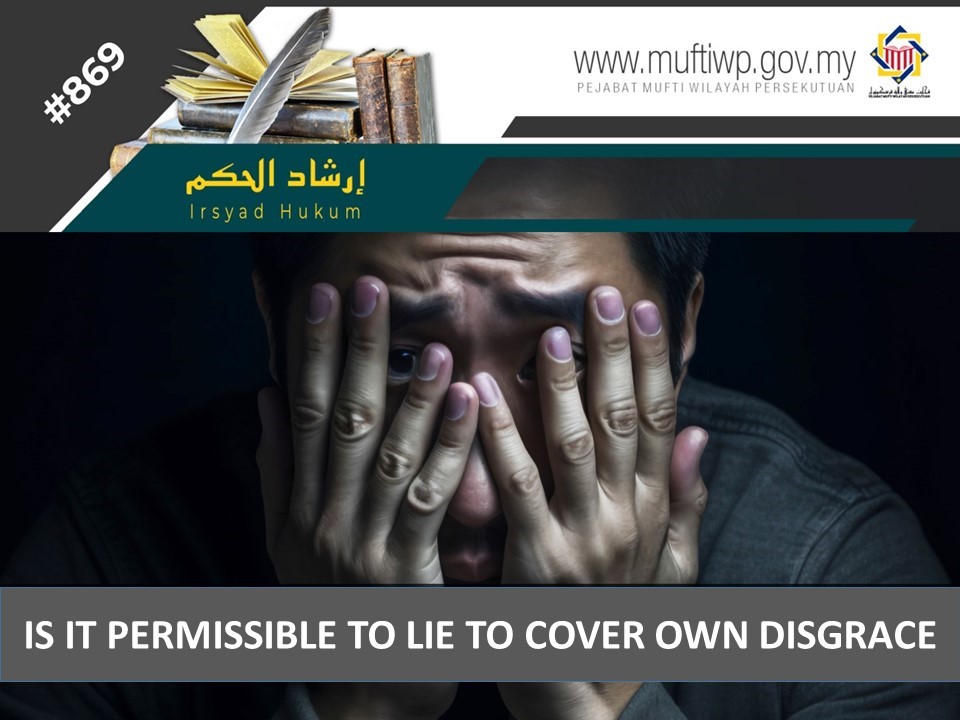
QUESTION
Assalamualaikum. At school, a teacher publicly asked our class if anyone had ever committed a particular sin. My question is: Is it permissible for me to deny it to conceal my past and protect my dignity? And if asked to take an oath, would it be allowed to swear falsely for the same reason?
ANSWER
1. It is permissible to lie to cover own disgrace, as long as others have not exposed the sin.
2. If asked to swear an oath, it is permissible to use tauriyah, such as saying, “I did not do that act,” while intending that the act was not done today.
3. This permissibility is conditional upon the sin not being exposed by others and not involving the taking or denying another person’s rights.
4. It must also be accompanied by repentance and a sincere effort to abandon the sin altogether, so this allowance is not used to continue sinning in secret.
EXPLANATION
Asking others about their personal sins is an act that is prohibited (حرام) and falls under Allah's prohibition against seeking out the faults and disgrace of others (التجسّس), as stated in His words:
يَا أَيُّهَا الَّذِينَ آمَنُوا اجْتَنِبُوا كَثِيرًا مِّنَ الظَّنِّ إِنَّ بَعْضَ الظَّنِّ إِثْمٌ ۖ وَلَا تَجَسَّسُوا وَلَا يَغْتَب بَّعْضُكُم بَعْضًا
Meaning: “O believers! Avoid many suspicions, for indeed, some suspicions are sinful. And do not spy, nor backbite one another.”
Surah Al-Hujurat (12)
According to Sheikh Wahbah al-Zuhaili, this verse contains a prohibition against the act of al-tajassus, which means seeking out the hidden faults of other Muslims.
Revealing own’s disgrace to others is also forbidden (حرام) if it is done with a sense of pride or by taking the sin lightly. This may result in the sin not being forgiven if one does not repent, as stated in the words of the Prophet Muhammad SAW:
كلُّ أُمَّتي مُعافًى إلا المجاهرين، و إنَّ من الجِهارِ أن يعملَ الرجلُ بالليلِ عملًا ثم يُصبِحُ و قد ستره اللهُ تعالى فيقولُ: عملتُ البارحةَ كذا و كذا، و قد بات يسترُه ربُّه، و يُصبِحُ يكشفُ سِترَ اللهِ عنه
Meaning: "All the sins of my followers will be forgiven except those of the Mujahirin (those who commit a sin openly or disclose their sins to the people). An example of such disclosure is that a person commits a sin at night and though Allah screens it from the public, then he comes in the morning, and says, 'O so-and-so, I did such-and-such (evil) deed yesterday,' though he spent his night screened by his Lord (none knowing about his sin) and in the morning he removes Allah's screen from himself."
(Narrated by al-Bukhari and Muslim)
However, if a person discloses their sin to others not out of pride or making light of it and not in a way that could influence others to commit the same sin, then it is considered discouraged (مكروه) as mentioned by Imam al-Nawawi. He said:
يُكره للإِنسان إذا ابتُلي بمعصيةٍ أو نحوها أن يخبرَ غيرَه بذلك
Meaning: "When a person is tested with a certain sin, it is discouraged (مكروه) to inform others about that sin."
Shaykh Ibn ‘Allan explained Imam al-Nawawi’s statement above, saying that the act of disclosing sin is considered discouraged (مكروه) when it is not done to take pleasure in or reminisce about the enjoyment of that sin. However, if it is done with such intentions, then it becomes forbidden (حرام). The best course of action is that if anyone sins, they should repent immediately, seek Allah’s forgiveness, and conceal the sin.
In addition, Imam al-Nawawi also explained that if the sin is disclosed to someone, such as a teacher to seek the cause and find a way out, then it is permissible (جواز) and even considered a good act, as it serves the benefit of helping the person to overcome the committed sin.
Furthermore, lying is forbidden (حرام) initially, and it is considered one of the major sins. However, according to Shaykh Muhammad bin Ahmad al-Saffarini, denying a personal sin that was previously committed, whether by oneself or others, is one of the situations where lying is permitted (جواز), to avoid being among those who expose their sins that Allah has already concealed. This is permitted on the condition that the sin has not already been revealed by others.
Therefore, based on the situation described in the question above, it is permissible (جواز) to lie by denying the past sin to conceal their disgrace. Suppose someone forces the person to swear an oath. In that case, it is allowed to use tauriyah by using a statement clearly understood by the listener but intending something else that is vague or hidden. For example, saying “I did not do that act,” while what is meant is “ I did not do that act today.
However, this permissibility is conditional upon the sin not involving taking or denying another person's rights. If it does involve the rights of others, then lying and the use of tauriyah to deny the sin become forbidden (حرام). The rulings regarding tauriyah in Islam have been further explained in the article Irsyad Hukum Series 324: The Ruling of Tauriyah in Islam.
Furthermore, the permissibility of lying by denying a previously committed sin must also be accompanied by sincere repentance from those sins so that it does not become a means of continuing to commit them in secret.
CONCLUSION
- It is permissible to lie to cover own disgrace, as long as others have not exposed the sin.
- If asked to swear an oath, it is permissible to use tauriyah, such as saying, “I did not do that act,” while intending that the act was not done today.
- This permissibility is conditional upon the sin not being exposed by others and not involving the taking or denying another person’s rights.
- It must also be accompanied by repentance and a sincere effort to abandon the sin altogether, so this allowance is not used to continue sinning secretly.

